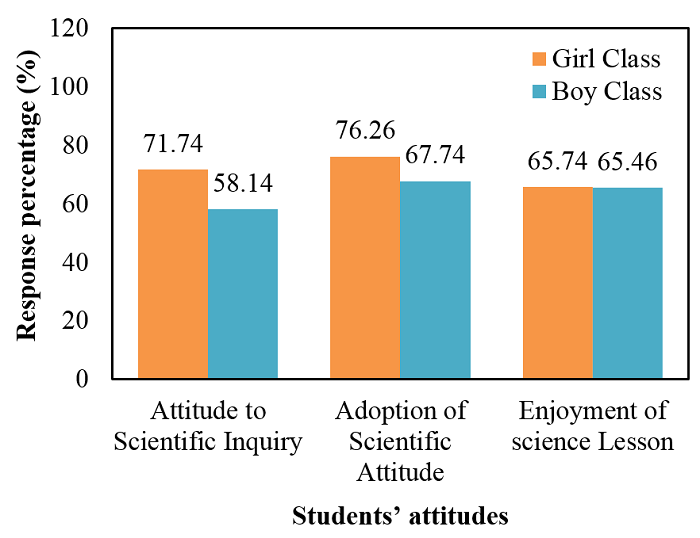
Students’ Cognitive and Attitude of Secondary School in Learning Global Warming using Student Team Achievement Division (STAD) based on Gender
Abstract
This study was intended to investigate students’ cognitive and attitude of secondary school in learning global warming using Student Team Achievement Division (STAD) based on gender. This study was conducted at one of bilingual boarding school in Bandung. This study uses the quasi-experimental method with matching pretest-posttest comparison group design while the number of subject in the girl class is 15 (N=15) and in the boy class is 15 (N=15). Data was gained through a cognitive test which measured by Bloom's taxonomy cognitive level (C1-C6), a questionnaire which measured by Test of Science Related Attitude (TOSRA). The result shows that student who learns global warming using STAD has an improvement on their cognitive score, especially in the girl class. Meanwhile, girl class has higher students’ attitude result in three scales of TOSRA that are; attitude to scientific inquiry, adoption of a scientific attitude, and enjoyment of science lessons. Along with the students’ cognitive result, girl class also has a better science-related attitude than the boy class. Thus, it can be concluded that there is a significant difference between students’ cognitive and attitude at the girl and boy class in learning global warming using STAD.
Full Text:
Download PDFReferences
Abu-Hola, I. (2005). Uncovering gender differences in science achievement and attitudes towards science for Jordanian primary pupils. Damascus University Journal, 21(1), 19-53.
Bätz, K., Wittler, S., & Wilde, M. (2010). Differences between boys and girls in extracurricular learning settings. International Journal of Environmental & Science Education, 5(1), 51-64.
Bastick, T. (2002). Gender Differences for 6-12th Grade Students over Bloom's Cognitive Domain. [Online]. Retrieved from http://eric.ed.gov/.
Creswell, W. J. (2012). Educational Research: Planning, Conducting and Evaluating Quantitative and Qualitative Research (4th ed). Boston USA: Pearson Education, Inc.
Fergusson, D. M., & Horwood, L. J. (1997). Gender differences in educational achievement in a New Zealand birth cohort. New Zealand Journal of Educational Studies, 32, 83-96.
Fraenkel, J. R., & Wallen, N. E. (2007). How to Design and Evaluate Research in Education, Sixth Edition. New York: Mc-Graw Hill.
Fraser, B, J. (1981). Test of Science-Related Attitudes. [Online]. Retrieved from http://www.pearweb.org/.
Gömleksiz, M. N. (2012). Elementary school students' perceptions of the new science and technology curriculum by gender. Journal of Educational Technology & Society, 15(1), 116-126.
Hassard, J., & Dias, M. (2008). Cooperative Learning Models. [Online]. Retrieved from http://cw.routledge.com/.
Johnson, D. W., & Johnson, R. T. (1999). Making cooperative learning work. Theory into practice, 38(2), 67-73.
Johnson, D. W., Johnson, R. T., & Stanne, M. B. (2000). Cooperative learning methods: A meta-analysis, 1-17.
Majoka, M. I., Dad, M. H., & Mahmood, T. (2010). Student team achievement division (STAD) as an active learning strategy: Empirical evidence from mathematics classroom. Journal of Education and Sociology, 4, 16-20.
Pandey, N, N., and Kishore, K. (2003). Effect of Cooperative Learning on Cognitive Achievement in Science. Journal of Science and Mathematics Education in Science Education Asia. 26(2), 52-60.
Pratiwi, W. N. W., Rochintaniawati, D., & Agustin, R. R. (2018). The Effect of Multiple Intelligence-Based Learning Towards Students' Concept Mastery and Interest in Matter. Journal of Science Learning, 1(2), 49-52.
Prima, E. C., Putri, C. L., & Sudargo, F. (2017). Applying Pre and Post Role-Plays supported by Stellarium Virtual Observatory to Improve Students’ Understanding on Learning Solar System. Journal of Science Learning, 1(1), 1-7.
Putri, A. U., Rusyati, L., & Rochintaniawati, D. (2018). The Impact of Problem-Solving Model on Students' Concept Mastery and Motivation in Learning Heat Based on Gender. Journal of Science Learning, 1(2), 71-76.
Slavin, R. E. (2010). Co-operative learning: what makes group-work work. The nature of learning: Using research to inspire practice, 161-178.
Sukmadinata, N, S. (2011). Metode Penelitian Pendidikan. Bandung: Remaja Rosdakarya.
Tran, V. D. (2013). Effects of student teams achievement division (STAD) on academic achievement, and attitudes of grade 9th secondary school students towards mathematics. International Journal of Sciences, 2(2013-04), 5-15.
Wardani, T. B., & Winarno, N. (2017). Using Inquiry-based Laboratory Activities in Lights and Optics Topic to Improve Students' Understanding About Nature of Science (NOS). Journal of Science Learning, 1(1), 28-35.
Zakaria, E., Chin, L. C., & Daud, M. Y. (2010). The effects of cooperative learning on students’ mathematics achievement and attitude towards mathematics. Journal of social sciences, 6(2), 272-275.
DOI: https://doi.org/10.17509/jsl.v1i3.11793
Refbacks
- There are currently no refbacks.
Copyright (c) 2018 Journal of Science Learning


Jl. Dr. Setiabudhi 229 Bandung 40154, West Java, Indonesia











